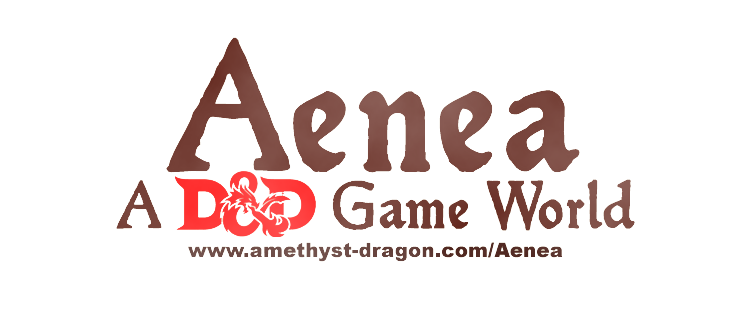

Aenea Player's Handbook
Updated: August 11, 2018
Note:
This document will be continually updated with new content until the start of a new campaign, so some formating may be "off" until that time.
An Introduction
Welcome, players, to the world of Aenea. This homebrew game world began back in the early 1990s, a time when the creator was just a teen with too little money to purchase published game world products and too much creativity to let a lack of money to keep him from writing adventures.
Aenea has seen several uses and revisions over the years. It began as a setting using the AD&D 2nd Edition rules, with house rules added over time. Background was slowly added, with geography, magic, and deities added as needed.
In 2002 things were changed over to use the rules for D&D 3rd Edition. The simplified gameplay made the work to convert things over worth it.
In 2006 the jump was made to online gaming, where Aenea became the setting for my long-running Neverwinter Nights persistent world, "The World of Aenea" (www.amethyst-dragon.com/nwn).
Now I am working on converting and updating things for the 5th Edition of D&D, with more options for players. Many of these options are a mix of things from my 3rd Edition games, ideas I developed for my Neverwinter Nights game world, and adaptations of 5th Edition content others have put online.
This particular publication, created via the Homebrewery website, is designed to be a resource for both players and DMs that may want to use ideas both unique and collected from various online sources.
Anything included in this document is fair game for players in my campaigns to use in developing their characters.
Good luck, and have fun.
-Nathan (known online as The Amethyst Dragon)
Outside Sources
Several outside sources are used in this publication. Credit links will lead to original websites, while content from published D&D resources will be noted.
Published Sources
The following published resources are referenced within:
Player's Handbook
Dungeon Master's Guide
EE - Elemental Evil Player's Companion
SCAG - Sword Coast Adventurer's Guide
XGtE - Xanathar's Guide to Everything
Table Of Contents (Clickable)
Chapter 4: Personality and Background
Character Details
Characters are defined by much more than their race and c1ass. They're individuais with their own stories, interests, connections, and capabilities beyond those that c1ass and race define. This chapter expounds on the details that distinguish characters from one another, including the basics of name and physical description, the rules of backgrounds and languages, and the finer points of personality and alignment.
Name
Your character's race description includes sample names for members of that race. Put some thought into your name even if you're just picking one from a list.
Sex
You can play a male or female character without gaining any special benefits or hindrances. Think about how your character does or does not conform to the broader cu!ture's expectations of sex, gender, and sexual behavior.
You don't need to be confined to binary notions of sex and gender. You could also play a female character who presents herself as a man, a man who feels trapped in a female body, or a bearded female dwarf who hates being mistaken for a male. Likewise, your character's sexual orientation is for you to decide.
Height and Weight
You can decide your character's height and weight, using the information provided in your race description or on the Random Height and Weight table. Think about what your character's ability scores might say about his or her height and weight. A weak but agile character might be thin. A strong and tough character might be tall or just heavy.
If you want to, you can roll randomly for your character's height and weight using the Random Height and Weight table on the following page. The dice roll given in the Height Modifier column determines the character's extra height (in inches) beyond the base height. That same roll multiplied by the dice roll or quantity given in the Weight Modifier column determines the character's extra weight (in pounds) beyond the base weight.
Other Physical Characteristics
You choose your character's age and the color of his or her hair, eyes, and skin. To add a touch of distinctiveness, you might want to give your character an unusual or memorable physical characteristic, such as a scar, a limp, or a tattoo.
Languages
Though listed in the D&D Player's Handbook, the Abyssal and Infernal languages do not exist in Aenea. Instead, there is a Demonic language common to all denizens of the Dark Realm.
| Race | Base Height | Height Modifier | Base Weight | Weight Modifier |
|---|---|---|---|---|
| Carnivoran, Canidan | 4'8" | +2d10 | 110 lb. | x (2d4) lb. |
| Carnivoran, Felidan | 4' | +3d10 | 90 lb. | x (3d4) lb. |
| Carnivoran, Hyaedan | 4'8" | +2d10 | 110 lb. | x (2d4) lb. |
| Carnivoran, Procyan | 2'7" | +2d4 | 35 lb. | x 1 lb. |
| Carnivoran, Ursidan | 6' | +2d8 | 190 lb. | x (2d6) lb. |
| Dragonborn | 5'6" | +2d8 | 175 lb. | x (2d6) lb. |
| Dragonborn, Earthsoul | 5'6" | +2d8 | 275 lb. | x (2d6) lb. |
| Dragonborn, Firesoul | 5'6" | +2d8 | 175 lb. | x (2d6) lb. |
| Dragonborn, Skysoul | 6' | +2d8 | 100 lb. | x (2d6) lb. |
| Dragonborn, Watersoul | 5'6" | +2d8 | 175 lb. | x (2d6) lb. |
| Dwarf, Demonborn | 3'8" | +2d4 | 115 lb. | x (2d6) lb. |
| Dwarf, Hill | 3'8" | +2d4 | 115 lb. | x (2d6) lb. |
| Dwarf, Mountain | 4' | +2d4 | 130 lb. | x (2d6) lb. |
| Dwarf, Ocean | 4' | +2d4 | 110 lb. | x (2d6) lb. |
| Elf, Dark | 4'5" | +2d6 | 75 lb. | x (1d6) lb. |
| Elf, High | 4'6" | +2d10 | 90 lb. | x (1d4) lb. |
| Elf, Sea | 4'6" | +2d10 | 90 lb. | x (1d4) lb. |
| Elf, Wood | 4'6" | +2d10 | 100 lb. | x (1d4) lb. |
| Elf, Winged | 4'6" | +2d8 | 75 lb. | x (1d6) lb. |
| Fae, Goblin Kin | 3' | +2d4 | 55 lb. | x 1 lb. |
| Fae, Lightfoot | 2'7" | +2d4 | 35 lb. | x 1 lb. |
| Fae, Mouseblood | 2'7" | +2d4 | 35 lb. | x 1 lb. |
| Fae, Stout | 2'7" | +2d4 | 35 lb. | x 1 lb. |
| Race | Base Height | Height Modifier | Base Weight | Weight Modifier |
|---|---|---|---|---|
| Gnome, Deep | 2'11" | +2d4 | 35 lb. | x 1 lb. |
| Gnome, Demonkin | 2'11" | +2d4 | 35 lb. | x 1 lb. |
| Gnome, Forest | 2'11" | +2d4 | 35 lb. | x 1 lb. |
| Gnome, Rock | 2'11" | +2d4 | 35 lb. | x 1 lb. |
| Half-Elf | 4'9" | +2d8 | 115 lb. | x (2d4) lb. |
| Half-Dark Elf | 4'8" | +2d6 | 110 lb. | x (2d4) lb. |
| Half-Sea Elf | 4'9" | +2d8 | 115 lb. | x (2d4) lb. |
| Half-Elf, Winged | 4'8" | +2d8 | 100 lb. | x (2d4) lb. |
| Half-Ogre | 8'4" | +8d8 | 600 lb. | x (2d6) lb. |
| Human | 4'8" | +2d10 | 110 lb. | x (2d4) lb. |
| Human, Demonblood | 4'8" | +2d10 | 110 lb. | x (2d4) lb. |
| Human, Triton Kin | 4'8" | +2d10 | 110 lb. | x (2d4) lb. |
| Human, Winged | 4'8" | +2d10 | 95 lb. | x (2d4) lb. |
| Orc | 4'10" | +2d10 | 140 lb. | x (2d6) lb. |
| Orc, Bestial | 5'3" | +2d10 | 170 lb. | x (2d6) lb. |
| Orc, Demonspawn | 4'10" | +2d10 | 140 lb. | x (2d6) lb. |
| Orc, Forest | 5'6" | +2d10 | 140 lb. | x (2d6) lb. |
Backgrounds
Your character's background reveals where you came from, how you became an adventurer, and your place in the world. Your fighter might have been a courageous knight or a grizzled soldier. Your wizard could have been a sage or an artisan. Your rogue might have gotten by as a guild thief or commanded audiences as a jester.
Acolyte
D&D Player's Handbook, pg. 127.
Adventurer's Whelp
One (or both) of your parents was an adventurer, and the call of it is in your blood. Maybe you grew up with stories of your parents' exploits, or maybe you desperately want to know what happened to your father oh-so-many years ago.
- Adapted from the Adventurer's Whelp found on theRPGsite.
- Skill Proficiencies: History, Insight
- Tool Proficiencies: Cartographer's tools
- Languages: Your choice of one standard or exotic language
- Equipment: A set of fine clothes, your parents' diary or a faded map to a dungeon or foreign land, a vial of ink, a ten foot pole, a boot knife, 20 gp in a belt pouch.
Feature: I Knew Your Parent
You can occasionally get some sort of support, magic, or information from your parents themselves, or from allies/acquaintances of theirs will periodically offer their aid.
Suggested Characteristics:
| d8 | Personality Trait |
|---|---|
| 1 | I often quote stories of my parents' exploits. |
| 2 | I try to collect stories of what actually happened in my parents' lives. |
| 3 | I try to hide from my parents' reputation. |
| 4 | My parents travelled far, so I live by the codes of a faraway land. |
| 5 | My parents taught me their livelihood, but sometimes all I really want is a common life. |
| 6 | I grew up watching wealth squandered outrageously, money means little to me. |
| 7 | I inherited a casual roughness or shamelessness that can shock my companions at times, such as readily taking to graverobbing or changing my armour in public. |
| 8 | My fathers/mothers profession is something I'm quite familiar with, I sometimes seem to think like one of them rather than what I was actually trained in. Perhaps I'll follow in their footsteps one day. |
| d6 | Ideal |
|---|---|
| 1 | Approval. I must live up to my parent's legend. (Good) |
| 2 | Tenacity. I will finish what my parents left unfinished. (Lawful) |
| 3 | Knowledge. I will find what became of a missing parent (or one of their companions). (Good) |
| 4 | Spite. I will prove that I'm better/different person to my parents. (Good/Evil) |
| 5 | Wanderlust. I'm all about the adventure and excitement. (Chaotic) |
| 6 | Revenge. I must seek vengeance for my parents. |
| d6 | Bond |
|---|---|
| 1 | I feel a kinship with other children of my parents' adventuring party. |
| 2 | I serve the same lord my father served. |
| 3 | I was raised to revere my parents' deity above all else. |
| 4 | I was given a memento of my parents, yet lost it. It must be retrieved. |
| 5 | My parents incurred debts that still have to be repaid. |
| 6 | The gold is all that matters, I picked up that much. |
| d6 | Flaw |
|---|---|
| 1 | I'm the child of a hero, dammit. Give me some respect. |
| 2 | I'll never be as good as them. |
| 3 | My parents' enemies yet haunt me. |
| 4 | I have been marked by magics that afflicted my parents. |
| 5 | I believe I have an inevitable destiny, and too easily behave recklessly. |
| 6 | My parents stories sometimes lead me to apply dungeoneering skills inappropriately, such as by mapping taverns I walk into or checking new suits of armor for traps. |
Charlatan
D&D Player's Handbook, pg. 128.
City Watch
Ignore any references to places of the Forgotten Realms in the description.
Sword Coast Adventurer's Guide, pg. 145.
Clan Crafter
Ignore any references to places of the Forgotten Realms in the description.
Sword Coast Adventurer's Guide, pg. 145.
Cloistered Scholar
Ignore any references to places of the Forgotten Realms in the description.
Sword Coast Adventurer's Guide, pg. 146.
Cook
You once were a chef, the king of food. Either you were an artisan chef with a fine sense of taste, a master chef who knows dozens on dozens of recipes by heart, or a cook at the mess hall, serving food quickly and on the double. You understand that food has a voice; it can express moods with the right combinations of ingredients, or bring people together with a peaceful meal. What brought you out of the kitchen? A rare ingredient? Maybe, you wanted to go on an adventure to diversify you recipe book? Regardless on why you decided to change pace from your culinary solitude, your cooking and food handling skills will prove vital to an adventuring party.
- Adapted from the Cook found on D&D Wiki).
- Skill Proficiencies: Insight, Performance
- Tool Proficiencies: Kitchen Implements
- Languages: Your choice of one standard language
- Equipment: A mess kit, a bottle of cooking oil, several recipe books, a tinderbox, an iron pot, costume or fine clothes, and a belt pouch containing 5 gp.
Feature: Through Their Stomachs
You are able to earn a comfortable living for free during your downtime, by working as a cook. In addition you are able to feed your adventuring companions modest meals each day for free, unless the DM discerns that you are in a barren place devoid of anything edible for miles, such as a desert or dungeon. You are also able to use your talents to arrange meetings with anyone interested in a free meal. By offering to a cook a free meal for someone who would appreciate it, you are able to have audience with them over that meal, or they may otherwise simply owe you a small favor.
Suggested Characteristics:
| d8 | Personality Trait |
|---|---|
| 1 | When I eat something I critique the dish aloud. |
| 2 | I multitask very well. |
| 3 | I let others know I expect them to work as hard as I do. |
| 4 | I make noises which indicate my mood when I eat. |
| 5 | When insulted, I hurl even greater insults (or food) back. |
| 6 | I like to take my time and savor each moment. |
| 7 | I try to keep things as clean as possible. |
| 8 | I am always on the lookout for something novel and exotic. |
| d6 | Ideal |
|---|---|
| 1 | Creativity. I don't even follow my own recipes, I just follow my gut instinct! (Chaotic) |
| 2 | Knowledge. You can learn a lot about people from what they choose to eat. (Neutral) |
| 3 | Hierarchy. I know my place. Know yours. (Lawful) |
| 4 | Generosity. My gift is for all to enjoy! (Good) |
| 5 | Community. I am just one contribution which keeps this society together. (Neutral) |
| 6 | Fame. I will be known as the greatest master chef for all time! (Any) |
| d6 | Bond |
|---|---|
| 1 | My grandmother had a secret recipe she took to her grave. I am trying to replicate it. |
| 2 | There is a famous chef who I idolize. |
| 3 | I am putting together a book of recipes from around the world! |
| 4 | While other lands have vibrant cuisine, nothing beats a meal in the home country. |
| 5 | I use only the elaborate techniques of my master, even when preparing simple dishes. |
| 6 | I always keep a bottle of my favorite spice or herb on hand. |
| d6 | Flaw |
|---|---|
| 1 | I'd rather eat nothing than something bland, stale, burnt, undercooked, or otherwise beneath me. |
| 2 | I am comedically competetive. |
| 3 | I am a gluttonous pig. |
| 4 | I whine and complain when uncomfortable. |
| 5 | I have little to no tolerance for frivolity. |
| 6 | I have troubles trusting others with their assigned tasks, especially if I assigned them. |

Courtier
Ignore any references to places of the Forgotten Realms in the description.
Sword Coast Adventurer's Guide, pg. 146.
Criminal
D&D Player's Handbook, pg. 129.
Entertainer
D&D Player's Handbook, pg. 130.
Far Traveler
Ignore any references to places of the Forgotten Realms in the description.
Sword Coast Adventurer's Guide, pg. 148.
Farmer
You were what most common folk are–a farmer. You worked on a lord's estate, their land, or you worked for a company and you produced resources from the land in return for food, shelter, clothing, protection, and other benefits. Farmers focus on raising living things and harvesting various useful goods–mostly food–from the land. Farmers make up the vast majority of the peasantry, alongside other raw resource producers, such as miners and fishermen. Farmers are a hearty, enduring folk, they work long hours under the sun often doing dirty and exhausting or even disgusting work.
- Adapted from the Farmer found on D&D Wiki).
- Skill Proficiencies: Animal Handling, Nature
- Tool Proficiencies: Vehicle (land) and Farm Implements)
- Equipment: A farm implement (such as a pitchfork or shovel), a set of work clothes or common clothes, a wide brimmed hat, a sack containing 5 gp worth of trade goods, and a belt pouch containing 5 gp.
Farm
Not every farm is alike; there are a vast range of goods produced by farmers of different sorts, and nearly all farms focus on just one product or a limited group of products.
| d6 | Specialization |
|---|---|
| 1 | Rancher. You raised animals for slaughter most likely for food, but also for leather, furs, and other useful materials. |
| 2 | Grazier. You harvested goods produced by animals such as milk, eggs, feathers, or wool. |
| 3 | Stockman. You bred animals to sell for work or as pets such as guard dogs, racing horses, and griffons. |
| 4 | Peasant. You harvested edible or useful plants such as wheat, corn crops, or apples at an orchard. |
| 5 | Forester. You grew trees for ornament or construction such as trees grown for bow staves, boat masts, or buildings. |
| 6 | Silk. You raised silk worms or another exotic animal, and harvested their silk. |
Feature: Of the Land
You lack the formal education of the higher classes, but for how little you may know there is a great deal that you understand. You have a practical, working knowledge of astrology and meteorology, and can easily track the time and date as well as predict the weather within a few hours, or days if you're lucky. You understand the "secrets of life"; the needs of life (water, light, air, salt, etc.), the patterns of physical inheritance, and the connections between different plants and animals.

Suggested Characteristics:
| d8 | Personality Trait |
|---|---|
| 1 | I'm always early to bed and early to rise. |
| 2 | I keep my gear and supplies in careful check. |
| 3 | I speak with a distinctive drawl or accent common to my class. |
| 4 | I always save up as much as I can, spending and consuming only what I must. |
| 5 | When work needs doing, I do the work. |
| 6 | I keep constant track of the sun, moon, stars, seasons, and weather. |
| 7 | I like to sleep in the sun when I can. |
| 8 | I'm always chewing on a sprig of grass, a toothpick, tobacco, seeds, or preserved meat. |
| d6 | Ideal |
|---|---|
| 1 | Fill the Need. There are a lot of hungry mouths in the world, with enough hands the world can feed them all. (Good) |
| 2 | It's a Living. I do what I'm good at because what I'm good at is good for me. (Neutral) |
| 3 | Brutal Practicality. Bury a fish or bury a man, just get the job done. (Evil) |
| 4 | Hard Work. A labor of love is a purpose and meaning. (Lawful) |
| 5 | A Simple Way of Life. If it ain't broke, don't fix it! (Neutral) |
| 6 | Amusment. Playing a hand in the growth and development of things delights me. (Chaotic) |
| d6 | Bond |
|---|---|
| 1 | I want to find that special someone and raise a home full of children. |
| 2 | I'll never forget the family farm I grew up on. |
| 3 | Some day, I'll be the lord of my own land. |
| 4 | I want to grow or raise the biggest or best example of my profession to prove I am the best! |
| 5 | My son was sent to war and never returned. I must find him. |
| 6 | I am out to start a homestead of my own in an unexplored fringe territory. |
| d6 | Flaw |
|---|---|
| 1 | I can be lazy and sleepy, sneaking off to take naps when work can wait. |
| 2 | I am absurdly isolated, innocent, or pious. |
| 3 | I believe in and obey my nation's nobility blindly. |
| 4 | I abandoned my home to avoid taxation, conscription, or court and cannot return. |
| 5 | I am not used to being wealthy and tend to overindulge. |
| 6 | I show off to attractive people too much. |
Folk Hero
D&D Player's Handbook, pg. 131.
Graverobber
Graverobbers come in a multitude of variations. The most petty stalk the slums and battlefields of the world for fresh corpses, rifling the pockets for some change and trinkets before dragging the poor sucker to the next necromancer or alchemist. One step above are those who break into graveyards to dig up the buried and breach mausoleums for fun and profit. Then there's those self styled scholars, who “explore” old necropolises, under the pretense of research. And who could forget the autodidact wannabe necromancer who digs out corpses to practice his arts and the blasphemer who does the whole thing just to spite others.
- Adapted from the Graverobber found on theRPGsite.
- Skill Proficiencies: Religion, Stealth
- Tool Proficiencies: Your choice of one of thieves' tools, vehicle (land), or alchemists tools
- Languages: Your choice of one standard or exotic language
- Equipment: Dark set of common clothes, shovel, crowbar, curious collection of inscriptions and reliefs in charcoal rubbings, box filled with worthless baubles that couldn't be sold.
Feature: Dead Trail
No graverobber stays alive long without a good portion of caution. You can identify and correctly interpret evidence of common undead, religious wards and traps and identify them automatically. You only exhibit this presence of mind at any kind of burial site.
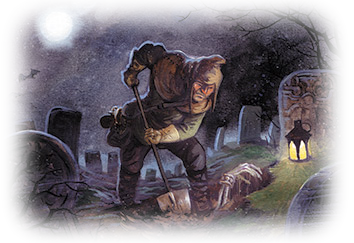
Suggested Characteristics:
| d8 | Personality Trait |
|---|---|
| 1 | I think blasphemy is the funniest thing in the world and I like sharing my humor. |
| 2 | My nocturnal work has left me as pale and spooky looking as my “customers”. |
| 3 | I collect holy symbols and give lip service to all gods equally. I think this puts me on the safe side. |
| 4 | I am obsessed with historical trivia and recount it whenever, even though most tell me it is all utter bogus. |
| 5 | I stay unperturbed at breaking graves and disturbing composing bodies, but I am supersticious in everyday activities. |
| 6 | I use measures such as excessive smoking or perfume to hide the stench of death on me. |
| 7 | I am so used to dealing with fences that I haggle in all my interactions. |
| 8 | I am prone to morbid speculation on my own and my friends immediate future. |
| d6 | Ideal |
|---|---|
| 1 | Wealth. Gems, gold and shiny trinkets, I love sound of coins, now everybody sing along. |
| 2 | Equality. I dug up beggars and lords alike and guess what? In death we are all the same. So, no reason for anyone to act high and mighty in life either. |
| 3 | Glory. They reject my scholarly works now, but I will make discoveries that will have scholars around the world singing my praise. |
| 4 | Spite. Call me a looser? A freak? Think I am no good? I will show you no good, I will show you all, bwahahaha! |
| 5 | Pragmatism. Why do what I do? I am good at it. That is the best one can do right? Get some food on the table, a roof that does not leak and always act professional, I say. |
| 6 | Immortality. I have seen dead a plenty and it is not for me. I heard for some, the burial is just the start of eternity and one of these graves holds their secret. |
| d6 | Bond |
|---|---|
| 1 | Hey, I have a lot of respect for the dead. In fact I once robbed my idols grave out of reverence. Still got the skull, tell him all my sorrows and dreams. |
| 2 | I was once caught by an old gravedigger, but instead of squealing on me, he got me some hot chocolate and useful tips. I have been taking care of the old creep ever since. |
| 3 | More than once I tracked down some nice heirloom only for my rival to take my prize. The reverse has happened just as often and the next time we always laugh it up over a beer. |
| 4 | I became a grave robber because I wanted to solve a great mystery of historical significance. I've lost the trail but I have sworn to fulfill my quest. |
| 5 | I came into the possession of a map to a legendary treasure, but I don't know what country it displays. |
| 6 | My mentor up and disappeared. I have to find them, maybe out of honest concern or because they owe me something. |
| d6 | Flaw |
|---|---|
| 1 | My job landed me a price on my head back home and the bounty hunters could come knocking any day. |
| 2 | The first graves I broke open where those of my own ancestors and I discovered a horrible family secret doing so. The shame lies heavy on me. |
| 3 | My soul is forsaken unless I bring a relict I sold back to the priests. |
| 4 | I once fought and killed a partner in crime in a dispute over the loot and I am pretty sure the greedy buggers body is still shuffling around somewhere. |
| 5 | I am incapable of leaving behind any loot, even at the price of my life. |
| 6 | I am far to good at my job and now some organization that is to unsavory even for me wants to recruit me with progressively greater pressure. |
Guild Artisan
D&D Player's Handbook, pg. 132.
Hermit
D&D Player's Handbook, pg. 134.
Inheritor
Ignore any references to places of the Forgotten Realms in the description.
Sword Coast Adventurer's Guide, pg. 150.
Knight of the Order
Ignore any references to places of the Forgotten Realms in the description.
Sword Coast Adventurer's Guide, pg. 151.
Mercenary Veteran
Ignore any references to places of the Forgotten Realms in the description.
Sword Coast Adventurer's Guide, pg. 152.
Noble
D&D Player's Handbook, pg. 135.
Outlander
D&D Player's Handbook, pg. 136.
Sage
D&D Player's Handbook, pg. 137.
Sailor
D&D Player's Handbook, pg. 139.
Soldier
D&D Player's Handbook, pg. 140.
Spy
At some point or another you secretly gathered information on a group of people or maybe one person. Maybe you were hired by a rival or political enemy, maybe you were searching for military information to help the opposing army, maybe you were trying to fulfil your own agenda, but regardless you are good at finding things and hiding your true self. You are used to living on the edge of danger, and doubly used to doubting people's intentions. Who did you spy for, yourself or some benefactor? Who or what did you spy on? What secrets did you uncover? Why did you stop, or did you?
- Adapted from the Spy found on D&D Wiki).
- Skill Proficiencies: Perception, Stealth
- Tool Proficiencies: Disguise kit, thieves' tools
- Equipment: A knife, a disguise kit, a small crumpled note with secrets you stole (could be battle plans, blackmail material, or coordinates to an unknown place) and a set of common clothes, and a small pouch with 15 gp.
Feature: Echo of the Great Game
Years of stealth and trickery have taught you how to not draw attention to yourself. The way you walk, talk and move are deliberately forgettable, and utterly unextraordinary. While you are wearing common clothes, no one can remember your face nor any features about you, unless they actively make an effort to do so.
In addition, you know how to write in a special code that can only be read by people trained in deciphering it.
Suggested Characteristics:
.
| d8 | Personality Trait |
|---|---|
| 1 | I always have an aloof smile plastered on my face, no matter the situation. |
| 2 | I am uncomfortable in open spaces, where I'm too exposed. |
| 3 | I change my attitude and personality to blend in with the people around me. |
| 4 | I always check the escape routes of every building I enter. |
| 5 | I have trouble trusting people, especially those closest to me. |
| 6 | I have a habit of listening in on the conversations of others. |
| 7 | I prefer not to talk unless it's necessary. |
| 8 | I write anything I think is important in code. |
| d6 | Ideal |
|---|---|
| 1 | Exposure. The evils of the world must be exposed. (Good) |
| 2 | Blackmail. Ooh, isn't this a dirty secret...? Shame if it fell into the wrong hands: mine. (Evil) |
| 3 | Contract. The information is bound to the person who hires me, no one else may see it. (Lawful) |
| 4 | The Game. If this came out to the public... That noble would be done for... That one too... Oh what fun! (Chaotic) |
| 5 | Self. The information is good, coming out alive better, the coin I'll get from this, totally worth it. (Neutral) |
| 6 | Knowledge. He knows something, and I need to know it too. (Any) |

| d6 | Bond |
|---|---|
| 1 | I fell in love with someone I was spying on. |
| 2 | I had some colleagues in a spy ring I used to be a part of that I trade information with from time to time. |
| 3 | I have secrets that I've uncovered that should never see the light of day. |
| 4 | One of my friends was hanged for treason. My helplessness to aid him still haunts me today. |
| 5 | A good person was ruined with information I gathered on him. I am trying to atone. |
| 6 | A servant in a castle saw me spying on her lord. I fled and hope I will never have to see her face again. |
| d6 | Flaw |
|---|---|
| 1 | I have no problem with betraying people who trust me. |
| 2 | Some people want to kill me, to make sure I never tell a secret they'd rather have untold. |
| 3 | I've worn so many disguises, I've lost sight of who I truly am. |
| 4 | I never share secrets with anyone. |
| 5 | I don't save people who can't save themselves. The Game is harsh and the stupid and flamboyant tend to die the first. |
| 6 | I never forget an insult, and I bide my time for revenge. |
Urban Bounty Hunter
Ignore any references to places of the Forgotten Realms in the description.
Sword Coast Adventurer's Guide, pg. 153.
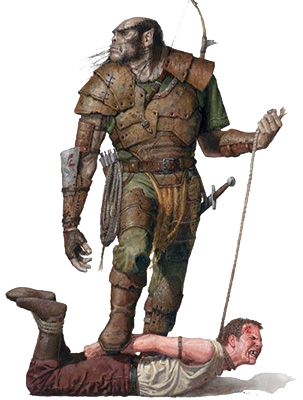
Urchin
D&D Player's Handbook, pg. 141.
Special Materials of Aenea
Aenea is a world rich in minerals, plants, animals, and magic. Some rare materials have special properties or value beyond those of normal substances. Some of those materials are described here.
Metals & Minerals
Adamantine
An inky black metal of incredible hardness, this material is mined deep in the Underdark or in the Elemental Plane of Earth.
Armor: Armor made from adamantine (medium or heavy armors) protects the wearer by reducing critical hits to normal hits.
Weapons: Whenever an adamantine weapon hits an object, the hit is a critical hit.
Adamantine items, if they can be found, will often sell for 50-100 times the price of a normal object.
Black Steel
This black metal is created by dwarves in the kingdom of Stonemor. It is usually used for decorative purposes, but it sometimes found in exotic weapons and armors. Black steel has the same properties as normal worked steel, save for its midnight hue.
Non-magical items made from black steel typically cost 300 gp more than a normal item of the same type.
Blood of Magic
This exceptionally rare mineral is always found in the exact same size and shape. It is a teardrop shaped, smooth, transluscent stone of deep red hue. Peering closely at one of these stones, the holder can just make out a faint light within that slowly pulses. Each of these stones is quite warm to the touch (nearly 100°F).
The real power of these stones comes from the magic that lies within them. When used in the enchanting process of making magical items, each of these stones reduces the time needed to enchant a magic item by 7 days. An individual blood of magic stone can only be used once in this way (it crumbles to red dust when used), but multiple stones can be used for a single magic item.
Dark Elf Steel
While it appears to be similar to adamantine, this matte black metal is much easier to work with. Created by dark elf magic acting on iron, it is lightweight and does not make sound.
Armors: Armors made from dark elf steel are one category lighter than normal for purposes of movement and other limitations. Heavy armors are treated as medium, and medium armors are treated as light (light armors are still treated as light). The armor's maximum Dexterity bonus is increased by 1. Dark elf steel armors do not impose disadvantage on stealth checks.
Non-armor or non-shield items made from dark elf steel weight half as much as the same item made from other metals. Items not primarily made of metal are unaffected in weight.
Dark elf steel is vulnerable to direct sunlight. Within minutes of exposure such items begin to rust. An hour of sunlight is enough to completely corrode and destroy an item made of dark elf steel.
Elven Silversteel
This metal is forged only by elven metalsmiths in the heart of the Sylvan Realm, and is an alloy of steel, silver, and mithral. It is exceptionally strong and lightweight, and it holds an edge very well. It looks a lot like silver, except that under moonlight or starlight it sparkles as if encrusted with thousands of tiny crystals.
Armor: Armors made from elven silversteel are one category lighter than normal for purposes of movement and other limitations. Heavy armors are treated as medium, and medium armors are treated as light (light armors are still treated as light). The armor's maximum Dexterity bonus is increased by 1.
Weapons: Weapons and other items made of elven silversteel are considered to be made of silver for purposes of affecting lycanthropes and other creatures.
Non-armor or non-shield items made from elven silversteel weight half as much as the same item made from other metals. Items not primarily made of metal are unaffected in weight.
Elven silversteel has an AC of 20 and 25 hit points per inch of thickness. The metal is not found in workable form outside the Sylvan Realm, and any heat hot enough to melt it ruins the alloy for any further use. The market price for items made of elven silversteel is typically at least 5,000 gp higher than a normal item of the same type.
Firegold
A rich gold color, this rare metal is created as an after effect of powerful earth or fire elemental magic. Originally ore bearing normal gold, it is changed by interaction with the most powerful of fire and earth elementals summoned to the Prime Material plane. The firegold is not magical itself, but it can later be enchanted just like normal gold.
Firegold is constantly warm to the touch (nearly 100° F), and it cannot be cooled or frozen. It glows with faint golden light equal to faerie fire in non-magical darkness. This metal typically costs at least 20 times the price of normal gold.
Glassteel
This rare metal is an alchemical creation first invented several centuries ago by a gnome living in the city of Calithia. The technique for making it has since spread to several other alchemists around the realms.
Glassteel has all the properties of normal steel, save that it is completely transparent. It finds use in rare decorative weapons and armors, as well as use in the occasional aquarium. When available, glassteel costs 20 times the amount that normal steel does.
Meteoric Steel
Smelted from the iron of one or more meteorites, this steel usually shows a green iridescence. It is said to hold various mystic powers.
Armor: Medium or heavy armor forged from meteoric steel sparks with green light when physically struck by demons or undead. This spark of light hurts such creatures, inflicting 1d4 points of radiant damage.
Weapons: Weapons made from meteoric steel inflict an extra 1d4 points of radiant damage against demons and undead as the metal glows with green light when such enemies are struck.
Mithral
Mithral is highly sought-after for its light weight and high durability. Armors made from it are strong but flexible. Weapons made from it are light and agile.
Armor: Armors made from mithral are one category lighter than normal for purposes of movement and other limitations. Heavy armors are treated as medium, and medium armors are treated as light (light armors are still treated as light). The armor's maximum Dexterity bonus is increased by 1.
Weapons: Weapons made primarily from mithral that do not have the Heavy property gain the Light and Finesse properties.
When available, items made from mithral typically cost at least 20 times the normal price.
Red Steel
This dark red metal is only found in certain volcanic deposits. It is often worked into jewelry and decorative weapons due to the rich crimson hue it takes on when worked and polished. Red steel has the same properties as normal worked steel, but it does not naturally rust or corrode.
Nonmagical items made from red steel typically cost 500 gp more than a normal item of the same type.
Teshian Steel
Items made from this metal are gradually becoming more rare, as they were originally produced only in the city of Tesh, which was overrun by orcs many years ago. Those items that remain are works of art and are very valuable.
Teshian steel is not an alloy, but a layering of normal steel and black steel. The unique folding and processing produced incredibly intricate wave patterns in the steel. Due to the purity of the metals, items of Teshian steel are stronger than normal steel.
Plants, Woods, & Other Organics
Bone
While very hard, objects made from bone are not usually as durable as those made from metal. It is still widely used for weapons, armor, or decorative items by those in more savage societies.
Armor: Bone can be used in place of metal for scale, breastplate, and half plate armor. The armor's AC is reduced by 1, while the Dex modifier maximum is increased by 1.
Weapons: Bone can be used in place of wood for various weapons.
Chitin
The hard, lightweight exoskeletons of beasts such as ankhegs, giant scorpions, and umber hulks can be used in the construction of some armors once it has been treated with certain alchemical substances.
Armor: Treated chitin can be used in place of metal in medium and heavy armors (with the exception of chain mail), as well as in shields. This reduces the armor's weight by 1/3 and lowers the minimum Strength needed to use certain armors by 1.
Items made from alchemically treated chitin typically cost 50% more than normal items of the same type.
Crystal Wood
This rare wood is found only within the trees of the Crystal Forest in the Sylvan Realm. The wood is normally transluscent white, but is sometimes stained shades of green, blue, or purple. Items made from this wood are incredibly rare and are made only by the most talented of elven craftsmen.
Deadwood
This pale grey wood, harvested from trees killed by necromantic magic, is painfully cold to the touch.
Weapon: A weapon crafted almost entirely of deadwood inflicts an extra 1d4 points of necrotic damage on a living creature that is struck.
Dragon Hide
Leather made from the hide of dragons is exceptionally flexible yet hard to damage. Additionally, it can protect the wearer from the breath of other dragons of the slain dragon's type.
Armor: Leather and hide armor made from dragon hide does not improve armor class beyond normal leather armor, but does provide the wearer with resistance to piercing damage from nonmagical sources.
Such armor provides resistance to damage based on the dragon's type: acid (black, copper), cold (silver, white), fire (brass, gold, red), or lightning (blue, bronze).
Weapons: A dragon hide whip (the only normally leather weapon) counts as a magical weapon.
Dragon Scale
Dragon scales are incredibly durable and resistant to damage, making them harder than steel.
Armor: Dragon scale armor or a shield covered with dragon scales provide an extra +1 bonus to AC.
Weapons: A weapon somehow carved from a dragon scale counts as magical.
Everleaf
A product of the Sylvan Realm, an everleaf is an ordinary tree leaf that stays vibrant and living after being removed from a tree, sometimes even for years afterward. If the original tree's leaves change color, the everleaf does as well with the seasons.
Armor: Clothing and armor covered with everleaves give the wearer advantage on Stealth checks when in forested areas.
An individual everleaf can fetch 5 gold coins on the open market outside the Sylvan Realm.
Fireoak
A hardwood tree like a normal red oak, fireoak is incredibly rare. These trees have bark that is black and looks like it has been charred by intense fire. Their leaves are orange, red, and gold. The entire surface of a fireoak radiates warmth, and prolonged contact of more than a minute can cause first degree burns. Living fireoaks are completely immune to any sort of fire or heat.
When cut, the wood of a fireoak is very dark brown in color like ironwood. It retains the heat of the living tree, although to a lesser degree (it cannot cause physical harm). The wood is resistant to fire. The wood is just as hard as normal oak.
Items crafted primarily of fireoak wood are considered masterwork, and cost at least 300 gp more than a normal item of the same type. Fireoak acorns are almost unknown and can fetch more than 1000 gp each on the open market.
Armor: Armor crafted from the wood of a fireoak is weaker than metal plate armors (AC 3 less than equivalent steel armor), but its eternal warmth provides the wearer with resistance to cold damage.
Chapter 6: Customization Options
While the many races and classes, with all of their various options, provide a lot of variety for characters, some players may want to be able to add even more customization.
In Aenea, player characters are allowed to use the optional rules to use both multiclassing and feats.
Multiclassing
Characters in Aenea can take on a second class (or even a third or fourth class) when they level up, with DM approval. Rules for multiclassing start on page 163 of the D&D Player's Handbook.
Feats
A feat represents a talent or an area of expertise that gives a character special capabilities. lt embodies training, experience, and abitities beyond what a c1ass provides.
At certain levels, your class gives you the Ability Score Improvement feature. Using the optional feats rule, you can forgo taking that feature to take a feat of your choice instead. You can take each feat only once, unless the feat's description says otherwise.
You must meet any prerequisite specified in a feat to take that feat. If you ever lose a feat's prerequisite, you can't use that feat until you regain the prerequisite. For example, the Grappler feat requires you to have a Strength of 13 or higher. If your Strength is reduced below 13 somehow-perhaps by a withering curse-you can't benefit from the Grappler feat until your Strength is restored.
The following are all of the feats available to characters in Aenea.
Alert
Player's Handbook, pg. 165.
Athlete
Player's Handbook, pg. 165.
Acrobat
- From Unearthed Arcana
You become more nimble, gaining the following benefits:
• Increase your Dexterity score by 1, to a maximum of 20.
• You gain proficiency in the Acrobatics skill. If you are already proficient in the skill, you add double your proficiency bonus to checks you make with it.
• As a bonus action, you can make a DC 15 Dexterity (Acrobatics) check. If you succeed, difficult terrain doesn’t cost you extra movement until the end of the current turn.
Actor
Player's Handbook, pg. 165.
Animal Handler
- From Unearthed Arcana
You master the techniques needed to train and handle animals. You gain the following benefits.
• Increase your Wisdom score by 1, to a aximum of 20.
• You gain proficiency in the Animal Handling skill. If you are already proficient in the skill, you add double your proficiency bonus to checks you make with it.
• You can use a bonus action on your turn to command one friendly beast within 60 feet of you that can hear you and that isn’t currently following the command of someone else. You decide now what action the beast will take and where it will move during its next turn, or you issue a general command that lasts for 1 minute, such as to guard a particular area.
Arcanist
- From Unearthed Arcana
You study the arcane arts, gaining the following benefits:
• Increase your Intelligence score by 1, to a maximum of 20.
• You gain proficiency in the Arcana skill. If you are already proficient in the skill, you add double your proficiency bonus to checks you make with it.
• You learn the prestidigitation and detect magicspells. You can cast detect magic once without expending a spell slot, and you regain the ability to do so when you finish a long rest.
Blindsighted
- Adapted from D&D Wiki)
Prerequisites: Wisdom 13 or higher
You've trained your senses to the point you can perceive your surroundings without sight. Your heightened senses give you the following benefits:
• You gain an advantage on Wisdom (Perception) checks that rely on hearing or smell.
• As a bonus action, you can focus your senses to the point you gain blindsight out to a 30 foot radius. This lasts until the start of your next turn. You lose this benefit while you are deafened.
Brawny
- From Unearthed Arcana
You become stronger, gaining the following benefits:
• Increase your Strength score by 1, to a maximum of 20.
• You gain proficiency in the Athletics skill. If you are already proficient in the skill, you add double your proficiency bonus to checks you make with it.
• You count as if you were one size larger for the purpose of determining your carrying capacity.
Charger
Player's Handbook, pg. 165.
Crossbow Expert
Player's Handbook, pg. 165.
Defensive Duelist
Prerequisite: Dexterity 13 or higher
Player's Handbook, pg. 165.
Deft Aegis
- Adapted from D&D Wiki)
Your familiarity with shields allows you to handle them with a ease. You gain the following benefits:
• You can don or doff a shield as if you were drawing or stowing a weapon, rather than as an action.
• You can hold or grasp an item with an arm that's wearing a shield. You can't make attacks using anything you're grasping with this arm.
• When making ranged attacks using a one-handed weapon and wearing a shield, you are considered to have a hand free for the purposes of both the Ammunition and Loading weapon qualities.
• You know just how to maneuver your shield to help you in sticky situations. Whenever you make an ability score test to avoid being shoved or grappled, you may use your reaction to move your shield in the way, adding its AC bonus to the check.
Diplomat
- From Unearthed Arcana
You master the arts of diplomacy, gaining the following benefits:
• Increase your Charisma score by 1, to a maximum of 20.
• You gain proficiency in the Persuasion skill. If you are already proficient in this skill, you add double your proficiency bonus to checks you make with it.
• If you spend 1 minute talking to someone who can understand what you say, you can make a Charisma (Persuasion) check contested by the creature’s Wisdom (Insight) check. If you or your companions are fighting the creature, your check automatically fails. If your check succeeds, the target is charmed by you as long as it remains within 60 feet of you and for 1 minute thereafter.
Dual Wielder
D&D Player's Handbook, pg. 165.
Dungeon Delver
Player's Handbook, pg. 166.
Durable
Player's Handbook, pg. 166.
Elemental Adept
Prerequisite: The ability to cast at last one spell
Player's Handbook, pg. 166.
Eldritch Trained
Prerequisite: Charisma 13 or Intelligence 13
You learn one eldritch invocation from the Warlock class. You may choose from any that do not require additional prerequisites or the use of spell slots. Charisma or Intelligence (chosen when you take this feat) is the ability score you use for any that cast spells.
You may take this feat multiple times, selecting a different eldritch invocation each time.
Empathic
- From Unearthed Arcana
You possess keen insight into how other people think and feel. You gain the following benefits:
• Increase your Wisdom score by 1, to a maximum of 20.
• You gain proficiency in the Insight skill. If you are already proficient in the skill, you add double your proficiency bonus to checks you make with it.
• You can use your action to try to get uncanny insight about one humanoid you can see within 30 feet of you. Make a Wisdom (Insight) check contested by the target’s Charisma (Deception) check. If your check succeeds, you have advantage on attack rolls and ability checks against the target until the end of your next turn.
Fleet of Foot
Prerequisites: Dexterity 13 or higher
With training you're speed has grown considerably:
• Your movement speed grows by 10 feet.
• You can use the Dash action as a bonus action.
Grappler
Prerequisite: Strength 13 ar higher
Player's Handbook, pg. 167.
Great Weapon Master
Player's Handbook, pg. 167.
Healer
Player's Handbook, pg. 167.
Heavily Armored
Prerequisite: Proficiency with medium armor
Player's Handbook, pg. 167.
Heavy Armor Master
Prerequisite: Proficiency with heavy armor
Player's Handbook, pg. 167.
Historian
- From Unearthed Arcana
Your study of history rewards you with the following benefits:
• Increase your Intelligence score by 1, to a maximum of 20.
• You gain proficiency in the History skill. If you are already proficient in the skill, you add double your proficiency bonus to checks you make with it.
• When you take the Help action to aid another creature’s ability check, you can make a DC 15 Intelligence (History) check. On a success, thatcreature’s check gains a bonus equal to your proficiency bonus, as you share pertinent advice and historical examples. To receive this bonus, the creature must be able to understand what you’re saying.
Hurler
- Adapted from D&D Wiki)
You have a particularly dangerous and skillful eye when hurling objects at opponents. You gain the following benefits:
• You are proficient with improvised weapons when using them as thrown weapons and consider them to have the finesse property.
• Attacking at long range doesn't impose disadvantage on your attack rolls with thrown weapons.
• Your attacks with thrown weapons ignore half cover and three-quarters cover.
• Whenever you make a ranged attack by throwing an item, you may immediately draw another item within reach as part of the action.
Inspiring Leader
Prerequisite: Charisma 13 ar higher
Player's Handbook, pg. 167.
Investigator
- From Unearthed Arcana
You have an eye for detail and can pick out the smallest clues. You gain the following benefits:
• Increase your Intelligence score by 1, to a maximum of 20.
• You gain proficiency in the Investigation skill. If you are already proficient in the skill, you add double your proficiency bonus to checks you make with it.
• You can take the Search action as a bonus action.
Keen Mind
Player's Handbook, pg. 167.
Legendary Strength
- Adapted from D&D Wiki)
Prerequisites: Strength 16 or higher
Years of intense combat and extensive weapons training granted you great physical power both in and out of combat. You gain the following benefits:
• When attacking with a weapon that has the versatile property in one hand, you may roll damage as if you were holding it in both hands.
• You now count as one size larger when determining your carrying capacity and the weight that you can push, drag, or lift.
If your Strength score is a 20, you gain the additional benefit:
• You may now wield weapons with the two-handed property in one hand and roll damage normally. When wielding this type of weapon in one hand, you may not wield a second weapon in your other hand. However, you may use a shield.
Lightly Armored
Player's Handbook, pg. 167.
Linguist
Player's Handbook, pg. 167.
Lucky
Player's Handbook, pg. 167.
Mage Slayer
Player's Handbook, pg. 168.
Magic Initiate
Player's Handbook, pg. 168.
Martial Adept
Player's Handbook, pg. 168.
Medic
- From Unearthed Arcana
You master the physician’s arts, gaining the following benefits:
• Increase your Wisdom score by 1, to a maximum of 20.
• You gain proficiency in the Medicine skill. If you are already proficient in the skill, you add double your proficiency bonus to checks you make with it.
• During a short rest, you can clean and bind the wounds of up to six willing beasts and humanoids. Make a DC 15 Wisdom (Medicine) check for each creature. On a success, if a creature spends a Hit Die during this rest, that creature can forgo the roll and instead regain the maximum number of hit points the die can restore. A creature can do so only once per rest, regardless of how many Hit Dice it spends.
Medium Armor Master
Prerequisite: Proficiency with medium armor
Player's Handbook, pg. 168.
Menacing
- From Unearthed Arcana
You become fearsome to others, gaining the following benefits:
• Increase your Charisma score by 1, to a maximum of 20.
• You gain proficiency in the Intimidation skill. If you are already proficient in the skill, you add double your proficiency bonus to checks you make with it.
• When you take the Attack action on your turn, you can replace one attack with an attempt todemoralize one humanoid you can see within 30 feet of you that can see and hear you. Make a Charisma (Intimidation) check contested by the target’s Wisdom (Insight) check. If your check succeeds, the target is frightened until the end of your next turn. If your check fails, the target can’t be frightened by you in this way for 1 hour.
Mobile
Player's Handbook, pg. 168.
Moderately Armored
Prerequisite: Proficiency with light armor
Player's Handbook, pg. 168.
Naturalist
- From Unearthed Arcana
Your extensive study of nature rewards you with the following benefits:
• Increase your Intelligence score by 1, to a maximum of 20.
• You gain proficiency in the Nature skill. If you are already proficient in the skill, you add double your proficiency bonus to checks you make with it.
• You learn the druidcraft and detect poison and disease spells. You can cast detect poison and disease once without expending a spell slot, and you regain the ability to do so when you finish a long rest.
Observant
Player's Handbook, pg. 168.
Perceptive
- From Unearthed Arcana
You hone your senses until they become razor sharp. You gain the following benefits:
• Increase your Wisdom score by 1, to a maximum of 20.
• You gain proficiency in the Perception skill. If you are already proficient in the skill, you add double your proficiency bonus to checks you make with it.
• Being in a lightly obscured area doesn’t impose disadvantage on your Wisdom (Perception) checks if you can both see and hear.
Performer
- From Unearthed Arcana
You master performance so that you can command any stage. You gain the following benefits:
• Increase your Charisma score by 1, to a maximum of 20.
• You gain proficiency in the Performance skill. If you are already proficient in the skill, you add double your proficiency bonus to checks you make with it.
While performing, you can try to distract one humanoid you can see who can see and hear you. Make a Charisma (Performance) check contested by the humanoid’s Wisdom (Insight) check. If your check succeeds, you grab the humanoid’s attention enough that it makes Wisdom (Perception) and Intelligence (Investigation) checks with disadvantage until you stop performing.
Polearm Master
Player's Handbook, pg. 168.
Quick-Fingered
- From Unearthed Arcana
Your nimble fingers and agility let you perform sleight of hand. You gain the following benefits:
• Increase your Dexterity score by 1, to a maximum of 20.
• You gain proficiency in the Sleight of Hand skill. If you are already proficient in the skill, you add double your proficiency bonus to checks you make with it.
• As a bonus action, you can make a Dexterity (Sleight of Hand) check to plant something on someone else, conceal an object on a creature, lift a purse, or take something from a pocket.
Resilient
Player's Handbook, pg. 168.
Ritual Caster
Prerequisite: Intelligence or Wisdom 13 or higher
Player's Handbook, pg. 169.
Savage Attacker
Player's Handbook, pg. 169.
Sentinel
Player's Handbook, pg. 169.
Sharpshooter
Player's Handbook, pg. 170.
Shield Master
Player's Handbook, pg. 170.
Silver-Tongued
- From Unearthed Arcana
You develop your conversational skill to better deceive others. You gain the following benefits:
• Increase your Charisma score by 1, to a maximum of 20.
• You gain proficiency in the Deception skill. If you are already proficient in the skill, you add double your proficiency bonus to checks you make with it.
• When you take the Attack action on your turn, you can replace one attack with an attempt to deceive one humanoid you can see within 30 feet of you that can see and hear you. Make a Charisma (Deception) check contested by the target’s Wisdom (Insight) check. If your check succeeds, your movement doesn’t provoke opportunity attacks from the target and your attack rolls against it have advantage; both benefits last until the end of your next turn or until you use this ability on a different target. If your check fails, the target can’t be deceived by you in this way for 1 hour.
Skilled
Player's Handbook, pg. 170.
Skulker
Prerequisite: Dexterity 13 or higher
Player's Handbook, pg. 170.
Spell Sniper
Prerequisite: The ability to cast at least one spell
Player's Handbook*, pg. 170.
Stealthy
- From Unearthed Arcana
You know how best to hide. You gain the following benefits: • Increase your Dexterity score by 1, to a maximum of 20.
• You gain proficiency in the Stealth skill. If you are already proficient in the skill, you add double your proficiency bonus to checks you make with it.
• If you are hidden, you can move up to 10 feet in the open without revealing yourself if you end the move in a position where you’re not clearly visible.
Survivalist
- From Unearthed Arcana
You master wilderness lore, gaining the following benefits: • Increase your Wisdom score by 1, to a maximum of 20.
• You gain proficiency in the Survival skill. If you are already proficient in the skill, you add double your proficiency bonus to checks you make with it.
• You learn the alarm spell. You can cast it once without expending a spell slot, and you regain the ability to do so when you finish a long rest.
Tavern Brawler
Player's Handbook, pg. 170.
Theologian
- From Unearthed Arcana
Your extensive study of religion rewards you with the following benefits: • Increase your Intelligence score by 1, to a maximum of 20.
• You gain proficiency in the Religion skill. If you are already proficient in the skill, you add double your proficiency bonus to checks you make with it.
• You learn the thaumaturgy and detect evil and good spells. You can cast detect evil and goodonce without expending a spell slot, and you regain the ability to do so when you finish a long rest.
Tough
Player's Handbook, pg. 170.
War Caster
Prerequisite: The ability to cast at least one spell
Player's Handbook*, pg. 170.
Feats: Racial Feats
The following feats, unlike previous ones, are available only to members of certain races. Such feats built on or enhance the racial tendencies of individual characters.
- Adapted from the racial feats in an article for Unearthed Arcana.
Bountiful Luck
Prerequisite: Fae
Whenever an ally you can see within 30 feet of you rolls a 1 on the d20 for an attack roll, an ability check, or a saving throw, you can use your reaction to let the ally reroll the die. The ally must use the new roll.
Critter Friend
Prerequisite: Gnome (forest)
Your friendship with animals mystically deepens. You gain the following benefits:
• You gain proficiency in the Animal Handling skill. If you’re already proficient in it, your proficiency bonus is doubled for any check you make with it.
• You learn the speak with animals spell and can cast it at will, without expending a spell slot. You also learn the animal friendship spell, and you can cast it once with this feat, without expending a spell slot. You regain the ability to cast it in this way when you finish a long rest. Intelligence is your spellcasting ability for these spells
Dark Elf High Magic
Prerequisite: Elf (dark)
You learn more of the spells typical for your people. You learn detect magic and can cast it at will, without expending a spell slot. You also learn levitate and dispel magic, each of which you can cast once without expending a spell slot. You regain the ability to cast the spell in this way when you finish a long rest. Charisma is your spellcasting ability for these spells.
Dragon Fear
Prerequisite: Dragonborn
When angered, you radiate menace. You gain the following benefits:
• Increase your Strength or Charisma score by 1, up to a maximum of 20.
• Instead of exhaling destructive energy, you can roar and expend a use of your breath weapon to force each creature of your choice within 30 feet of you to make a Wisdom saving throw (DC 8 + your proficiency bonus + your Charisma modifier). A target automatically succeeds if it can’t hear or see you. On a failed save, a target becomes frightened for 1 minute. If the frightened target takes any damage, it can repeat the saving throw, ending the effect on itself on a success.
Dragon Hide
Prerequisite: Dragonborn
You inherited the might and majesty of your dragon ancestors. You gain the following benefits:
• Increase your Strength or Charisma score by 1, up to a maximum of 20.
• You grow retractable claws from the tips of your fingers. Extending or retracting the claws requires no action. The claws are natural weapons, which you can use to make unarmed strikes. If you hit with them, you deal slashingdamage equal to 1d4 + your Strength modifier, instead of the bludgeoning damage normal for an unarmed strike.
• Your scales harden; you gain a +1 bonus to AC while you aren’t wearing armor.
Dragon Wings
Prerequisite: Dragonborn
You sprout draconic wings. With your wings, you have a flying speed of 20 feet if you aren’t wearing heavy armor and aren’t exceeding your carrying capacity.
If you gain the ability to gain wings from another source, such as the Sorcerer Draconic Bloodline's 14th level feature, you will gain the ability to make your wings vanish at that time.
Dwarf Resilience
Prerequisite: Dwarf
You have the blood of dwarf heroes flowing through your veins. You gain the following benefits:
• Increase your Constitution score by 1, to a maximum of 20.
• Whenever you take the Dodge action in combat, you can spend one Hit Die to heal yourself. Roll the die, add your Constitution modifier, and regain a number of hit points equal to the total (minimum of 1).
Elven Accuracy
Prerequisite: Elf or half-elf
You have uncanny aim. You gain the following benefits:
• Increase your Dexterity score by 1, to a maximum of 20.
• Whenever you have advantage on an attack roll, you can reroll one of the dice once.
Everybody’s Friend
Prerequisite: Half-elf
You develop your magnetic personality to ease your way through the world. You gain the following benefits:
• Increase your Charisma score by 1, up to a maximum of 20.
• You gain proficiency in the Deception and Persuasion skills. If you’re already proficient in either skill, your proficiency bonus is doubled for any check you make with that skill.
Fade Away
Prerequisite: Fae or Gnome
You can draw on your magical heritage to escape danger. You gain the following benefits:
• Increase your Intelligence score by 1, up to a maximum of 20.
• When you take damage, you can use a reaction to magically become invisible until the end of your next turn or until you attack, deal damage, or force someone to make a saving throw. Once you use this ability, you can’t do so again until you finish a short or long rest.
Fey Teleportation
Prerequisite: Elf (high)
Drawing on your fey ancestry, you have learned how to teleport. You gain the following benefits:
• Increase your Intelligence score by 1, to a maximum of 20.
• You learn the misty step spell and can cast it once without expending a spell slot. You regain the ability to cast it in this way when you finish a short or long rest. Intelligence is your spellcasting ability for this spell.
Grudge-Bearer
Prerequisite: Dwarf
You have a deep hatred for a particular kind of creature. Choose your foes, a type of creature to bear the burden of your wrath: aberrations, beasts, celestials, constructs, dragons, elementals, fey, fiends, giants, monstrosities, oozes, plants, or undead. Alternatively, you can choose two races of humanoid (such as gnolls and orcs). You gain the following benefits:
• Increase your Strength, Constitution, or Wisdom score by 1, to a maximum of 20.
• During the first round of any combat against your chosen foes, your attack rolls against any of them have advantage.
• When any of your chosen foes makes an opportunity attack against you, it makes the attack roll with disadvantage.
• Whenever you make an Intelligence (Arcana, History, Nature, or Religion) check to recall information about your chosen foes, you add double your proficiency bonus to the check, even if you’re not normally proficient.
Human Determination
Prerequisite: Human
You are filled with a determination that can draw the unreachable within your reach. You gain the following benefits:
• Increase one ability score of your choice by 1, to a maximum of 20.
• When you make an attack roll, an ability check, or a saving throw, you can do so with advantage. Once you use this ability, you can’t use it again until you finish a short or long rest.
Orcish Aggression
Prerequisite: Orc
As a bonus action, you can move up to your speed toward an enemy of your choice that you can see or hear. You must end this move closer to the enemy than you started.
Orcish Fury
Prerequisite: Orc
Your fury burns tirelessly. You gain the following benefits:
• Increase your Strength or Constitution score by 1, up to a maximum of 20.
• When you hit with an attack made with a simple or martial weapon, you can roll one of the weapon’s damage dice an additional time and add it as extra damage of the weapon’s damage type. Once you use this ability, you can’t use it again until you finish a short or long rest.
• Immediately after you use your Relentless Endurance trait, you can use your reaction to make one weapon attack.
Prodigy
Prerequisite: Half-elf or human
You have a knack for learning new things. You gain the following benefits:
• Increase one ability score of your choice by 1, to a maximum of 20.
• You gain one skill proficiency of your choice, one tool proficiency of your choice, and fluency in one language of your choice.
Second Chance
Prerequisite: Fae
Fortune favors you. You gain the following benefits:
• Increase your Dexterity, Constitution, or Charisma score by 1, to a maximum of 20.
• When a creature you can see hits you with an attack roll, you can use your reaction to force that creature to reroll. Once you use this ability, you can’t do so again until you finish a short or long rest.
Squat Nimbleness
Prerequisite: Dwarf, gnome, or fae
You are uncommonly nimble for your race. You gain the following benefits:
• Increase your Strength or Dexterity score by 1, to a maximum of 20.
• Increase your walking speed by 5 feet.
• You gain proficiency in the Acrobatics or Athletics skill. If you’re already proficient in the skill, your proficiency bonus is doubled for any check you make with it.
Wonder Maker
Prerequisite: Gnome (rock)
You master the tinker techniques of your people. You gain the following benefits:
• Increase your Dexterity or Intelligence score by 1, to a maximum of 20. • When you make a check using your proficiency with tinker’s tools, you add double your proficiency bonus to the check. • When you make a device with your Tinker trait, you have the following additional options for what you make:
Alarm. This device senses when a creaturemoves to within 15 feet of it without speaking aloud a password chosen when you create it. One round after a creature moves into range, the alarm makes a shrill ringing that lasts for 1 minute and can be heard from up to 300 feet awayCalculator. This device makes doing sums easy.
Lifter. This device can be used as a block and tackle, allowing its user to hoist five times the weight the user can normally lift.
Timekeeper. This pocket watch keeps accurate time.
Weather Sensor. When used as an action, this device predicts weather conditions in a 1-mile radius over the next 4 hours, showing one symbol (clouds, sun/moon, rain, or snow) for each hour.
Wood Elf Magic
Prerequisite: Elf (wood)
You learn the magic of the primeval woods. You learn one druid cantrip of your choice. You also learn longstrider and pass without trace, each of which you can cast once without expending a spell slot. You regain the ability to cast the spell in this way when you finish a long rest. Wisdom is your spellcasting ability for these spells.
Chapter 7: Spells
The collection of spells available to Aenean player characters keeps expanding, and has been moved to a separate document devoted just to spells and magic. Spell lists and full spell descriptions (for spells not in the D&D Player's Handbook or Elemental Evil Player's Companion) are found by following this link:
Chapter 8: Deities of Aenea
Aenea is a world in which the gods and goddesses play a constant, yet often indirect role. There are twenty deities that influence and control the different aspects of the world through their own powers and through their different priesthoods.
Each god or goddess of Aenea has their own specialty priests (clerics).
If you are a priest, you automaticaly gain proficiency with your parton deity's favored weapon, if you don't already have it from your class.
If you are not a priest, you can still take a vow of devotion to a single deity. Priests of that diety, and other NPCs, may treat your differently if you are known as an avowed follower.
Andra (Earthmother)
Goddess of Nature
Andra is a loving and protective deity. She takes responsibility for the health and success of every plant and animal that lives on Aenea. She works to preserve the natural order of things in the world. She is often prayed to by those that make a responsible living from the natural world (which she approves of) and those that desire protection from dangerous animals. She is the patron deity of all rangers. Her priests are known as druids, and can usually be found wearing garments of green and brown.
- Alignment: Lawful Neutral
- Favored Weapon: Quarterstaff
- Favored Color(s): Green, Brown
- Priests' Titles: Druid, Wildfriend, Wilderness Protector
Notes
- There are no clerics of Andra, as all of her priests are druids.

Aquar (Waterlord)
Elemental God of Water
Aquar is a patient and distant god. He holds dominion over all of the water in and on Aenea, in all of its forms. He does not often involve himself in the affairs of mortals. His priests can be found everywhere in robes and armor of various blues and greens. He is often prayed to by those traveling by river or lake and by those in need of water.
- Alignment: Neutral
- Favored Weapon: Trident
- Favored Color(s): Blue, Green
- Priests' Titles: Waterbringer
- Divine Domains: Water

Asis (Lifebringer)
Goddess of Life, Birth, and Healing
Asis is the deity most concerned with the vital force that is life. She is the patron goddess of midwives, mothers, and healers. Her temples are sanctuaries for the wounded and ill. Her priests, usually garbed in white and gold, are said to be the best healers in the world.
Asis is the twin sister to Zolaras, and their priesthoods are known to generally respect each other.
- Alignment: Neutral Good
- Favored Weapon: Net
- Favored Color(s): White, Gold
- Priests' Titles: Healer, Mother, Father
- Divine Domains: Life

Borzig (Stormbringer)
God of Weather and Agriculture
As the god of weather and agriculture, Borzig is responsible for almost every creature on Aenea being able to eat. He helps fields remain fertile and brings rains to grow plants. He is usually followed more by people in rural areas. His priests, often dressed in simple browns and whites, regularly bless fields and crops. His priests are also said to be able to call down the fury of the storms to smite their enemies.
- Alignment: Neutral
- Favored Weapon: Spear
- Favored Color(s): Brown, White
- Priests' Titles: Rainbringer, Weatherman, Weatherwoman, Stormsinger, Fieldsower
- Divine Domains: Tempest
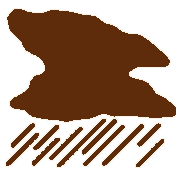
Dalix (The Warder)
Goddess of Guardians, Honor, and Protection
Dalix is the patron deity of all those that give or need protection. Her shrines are found in many a guard barracks, and many different protective charms bear her symbol. She is the patron deity of most paladins. Her priests are often found in guardian roles in the greys and silvers of polished steel.
- Alignment: Lawful Good
- Favored Weapon: Warhammer
- Favored Color(s): Grey, Silver
- Priests' Titles: Steelheart, Ironwilled, Honorable One, Protector
- Divine Domains: Protection

Gort (The Wanderer)
God of Horses, Travelers, Nomads, and the Lost
Usually called upon by those moving from one place to another, Gort is the god of all travel. He is worshipped by all races, especially those such as centaurs and others with relations to horses. He is prayed to when undertaking a long or dangerous journey. He helps those that are lost find their way home and those that need to to become lost. His priests, dressed in oranges and browns, are often seen walking, running, or riding great distances for any number of reasons.
- Alignment: Chaoticc Good
- Favored Weapon: Quarterstaff
- Favored Color(s): Orange, Brown
- Priests' Titles: Horseman, Horsewoman, Wanderer, Trailmaster, Trailmistress
- Divine Domains: Travel

Harcorth (Master of the Depths)
God of the Seas and Oceans
Harcorth is the patron deity of sailors, fishermen, pirates, and undersea races. Many prayers go to him before, during, and after sea voyages. His priests, who typically dress in blue and white, are said to be able to summon sharks and breath water like the fish in the seas. Few are the sailors that do not invoke his name before a voyage, as many fear Harcorth's displeasure.
- Alignment: Lawful Evil
- Favored Weapon: Trident
- Favored Color(s): Blue, White
- Priests' Titles: Sharksister, Sharkbrother, Sea Priest, Seawalker
- Divine Domains: Oceanic

Ignia (Firequeen)
Elemental Goddess of Fire, Mistress of Jealousy
Ignia rules over all sorts of fires, from the smallest of candles to the most devastating of volcanoes. She is also responsible for the burning fires of jealousy. Her worshipers include anyone trying to start or control fires, from the blacksmith at his forge to the pyromaniac evoker entering battle. Her priests dress in the golds and reds of fire and are said to be able to walk through the largest of blazes unharmed.
- Alignment: Neutral
- Favored Weapon: Shortsword
- Favored Color(s): Gold, Red
- Priests' Titles: Flamebreather, Firedancer, Torchbearer
- Divine Domains: Fire

Jewel (Shimmerstar)
Goddess of Love, Beauty, Passion, Gems, and the Arts
Jewel is the patron goddess of all those who desire love or are in love. She supports all of the different arts, from painting and sculpture to music and acting. She is the goddess of beauty and gems, and she takes great pride in all of the beauty in the world. Many different types of love charms bear her symbol.
Her seductresses, seductors, and heartseekers dress in rich reds accented by silver, and they work to further the causes of love, passion, and seduction.
Her poets and starchildren are usually garbed in silver with red accents, and they work to further the causes of beauty and art.
- Alignment: Neutral Good
- Favored Weapon: Shortbow
- Favored Color(s): Red, Silver
- Priests' Titles: Seductress, Seductor, Poet, Heartseeker, Starchild
- Divine Domains: Artistry, Love

Kalas (The Great Judge)
God of Justice, Reward, and Punishment, Lord of Knowledge and Wisdom
Kalas is considered the greatest caretaker of law in the world. He is worshipped by those that would uphold the law, and is feared by those that would commit crimes. As the god of knowledge, he is followed closely by scholars and wizards. His priests are often called upon to preside over disputes. Kalas' priest wear black, gray, and white, signifying their ability to view that which is apparent and that which is not.
- Alignment: Lawful Neutral
- Favored Weapon: Mace
- Favored Color(s): Black, Gray, White
- Priests' Titles: Judge, Truthseeker, Arbitrator
- Divine Domains: Knowledge, Law
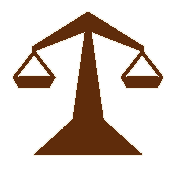
Lysis (Lady Luck)
Goddess of Fortune, Fate, Luck, and Rogues
In any situation in which a person wants good luck, he or she will pray to Lysis. Lysis isthe mistress of luck and fate, and she controls who has good luck and who does not. She knows the fate of every being in the world and can change that fate as she sees fit. Lysis is also the goddess of fortune, and she is worshipped by merchants and treasure seekers. Her priests often dress in variants of silver and gold, and they are said to be able to learn the outcome of events before they happen.
- Alignment: Neutral
- Favored Weapon: Shortsword
- Favored Color(s): Silver, Gold
- Priests' Titles: Fatereader, Fortunate One, Chancetaker, Luck Granter
- Divine Domains: Luck

Mystara (Mistress of Magic)
Goddess of Magic
Mystara holds dominion over all magic in Aenea. It is her spirit which regulates the flow of mystical energies and it is her will that allows wizards, priests, and other creatures to control magic. She often receives prayers from wizards attempting difficult spells and from others hoping to avoid the effects of dangerous magic. It is rumoured that her silver and green garbed priests are able to use the powers of wizards.
- Alignment: Neutral
- Favored Weapon: Dagger
- Favored Color(s): Silver, Green
- Priests' Titles: Holy Magi, Spellpriest
- Divine Domains: Arcana

Prizimal (Darklight)
God of Light and Darkness, Lord of the Sun and the Moons, Keeper of the Balance
Prizimal is the epitome of balance. He commands both light and darkness, day and night. His black and white clad priests are the best people in the world at looking at both sides of any situation and seeing where balance is needed. Prizimal is worshipped by those waiting for dawn and those waiting for nightfall. Many of his followers are criminals, many uphold the law.
- Alignment: Neutral
- Favored Weapon: Quarterstaff
- Favored Color(s): Black, White
- Priests' Titles: Sun Priest, Moon Priest, Child of Light and Darkness, Sunbringer, Darkbringer
- Divine Domains: Darkness, Light

Ragnor (The Broken One)
God of Destruction, Insanity, Strife, and Chaos
Ragnor is an evil god who thrives on destruction of all sorts. He hates anything good and seeks to kill and destroy everything that is not under his direct control. He is mentally unstable and is given credit for all of the insanity in the world. He is often worshipped by those bent on destruction, and he is called upon by the mentally unbalanced. His priests, dressed in blacks and red, are said to be able to cause others to go out of their minds with a mere touch.
- Alignment: Chaotic Evil
- Favored Weapon: Greataxe
- Favored Color(s): Black, Red
- Priests' Titles: Destroyer, Mindslayer, Holy Lunatic, Devastator, Soulbreaker
- Divine Domains: Death, Madness

Ralth (Forgemaster)
God of the Forge, Lord of All Crafts
Ralth is the patron god of the dwarves and all others that create useful items. His priests are often seen in gold and black creating the highest quality weapons, armor, tools, and even machines of war. It is rumored that priests of Ralth can even forge items with magical properties beyond what even some wizards can create.
- Alignment: Neutral Good
- Favored Weapon: Warhammer
- Favored Color(s): Gold, Black
- Priests' Titles: Forge Priest, Craftsmaster, Blessed Smith
- Divine Domains: Forge

Sorgath (The Serpent Lord)
God of Snakes, Poison, Assassins, Murder, Corruption, Lies, and Foul Play
Sorgath is the god few will openly talk about. His influence is felt almost everywhere, but it is not obvious to most. He is the corruptor of spirits and the driving force behind many lies and murders. His followers include politicians and assassins. His most numerous worshipers are the evil dark elves. His priests are usually found garbed in foul grays and greens and they are thought to have to power to turn into snakes.
- Alignment: Neutral Evil
- Favored Weapon: Dagger
- Favored Color(s): Grey, Green
- Priests' Titles: Corruptor, Slayer, Blacktongue, Fang of the Serpent, High Murderer
- Divine Domains: Death, Trickery

Terris (The Crystal Queen)
Elemental Goddess of Earth and Stone
Terris is the one who rules over all types of earth and stone. She is the patron goddess of those that work with stone, such as miners and masons. She is known to be very patient and strong willed. Her priests typically dress in browns and golds. They often bless structures made from stone and are said to be able to speak to the very rocks around them.
- Alignment: Neutral
- Favored Weapon: War Pick
- Favored Color(s): Brown, Gold
- Priests' Titles: Stoneseeker, Crystalheart, Stoneheart
- Divine Domains: Earth
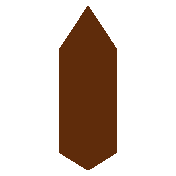
Torgat (Challengebringer)
God of Battle, Lord of Conquerors
Torgat is the patron god of all those that do battle. Generals and chieftains, warriors and conqueror all worship him. His interests include all battles, be they on the battlefield or in the mind. It does not matter to Torgat which side wins any battle, just so that there is battle. His priests, bearing the primary colors of blue, red, and yellow, are often found leading others into battle.
- Alignment: Chaotic Neutral
- Favored Weapon: Longsword
- Favored Color(s): Blue, Red, Yellow
- Priests' Titles: War Priest, Battlemaster, High Warrior
- Divine Domains: War
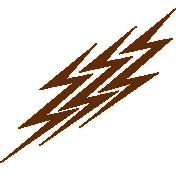
Typhis (Queen of the Skies)
Elemental Goddess of Wind and Air
Typhis controls the winds and the air all over the world of Aenea. She commands the breezes that cool and the tornadoes that kill. Her temples are usually found in places with constant winds. Her priests, garbed in light blues and greens, are often met during powerful storms.
- Alignment: Chaotic Neutral
- Favored Weapon: Shortbow
- Favored Color(s): Light Blue, Light Green
- Priests' Titles: Windsinger, Skywatcher, Cloudseer
- Divine Domains: Air

Zolaras (Lady Death)
Goddess of Death, the Dead, and the Undead
Zolaras holds dominion over everything to do with death. She controls every creature's actual death, handles their souls after they are dead, and allows some creatures to exist as undead. She knows that everything eventually comes to her. She is worshipped by those expecting death, those mourning the death of others, and intelligent undead. She is the twin sister of the goddess Asis. Her priests, who dress in blacks and silvers, are all female, and are said to have the dead serving them as guards and servants.
- Alignment: Neutral
- Favored Weapon: Mace
- Favored Color(s): Black, Silver
- Priests' Titles: Deathsinger, Speaker for the Dead, Soulguard
- Divine Domains: Grave
Notes
Only female characters may be clerics of Zolaras.

Chapter 9: General Aenean Information
The world of Aenea has existed for many millions of years. It and its family of celestial objects were born of the creative efforts of the entire pantheon of gods and goddesses (who themselves were created by Asis and Zolaras, twin goddesses of life and death). The elemental deities (Aquar, Ignia, Terris, and Typhis) created the planets, while Asis and Andra (goddess of nature) blessed the worlds with life. Prizimal lit the darkness of the void with his creation of the sun, moons, and stars. The other deities followed in weaving their own influences throughout the main world of Aenea.
Since its creation, Aenea has provided a home to countless lives and activities. Civilizations rose and fell and rose again. Magical creatures appears and spread their influences over the mortal races. Ideas, new and old, shaped the world as it now stands. Scholars are constantly learning more about the past and present of Aenea...some of their findings are found here.
Timeline
As historians and researches rediscover more of Aenea's past, the information found here will expand. For now, here are some of the major events which have transpired.
Aenean Recorded Timeline
| Known Year(s) | Event(s) | Information |
|---|---|---|
| 0 | Foundation of Moonblaze | The elven city is founded. The start of Filen Shenadin (the Kingdom of Silver). |
| 50 | The Warrior's Sacrifice | Torgat rises to godhood, sacrificing all that comes with a mortal life to take over for the previous god of battle. |
| 51 | The Schism | The dark elves violently split from elven society and delve underground. |
| 956-988 | Scourge of Dragons | Evil dragons destroy much of the land and peoples of the realms. In the end, the evil dragons are decimated by the elven Sindarin. |
| 1027 | The First Minting | The first standardized coins are minted in Moonblaze and begin circulation. |
| 2783 | Foundation of Ravenport | The city of Ravenport is founded as a trading center. |
| 3001 | The Black Week | One week when the sun did not rise, caused by an angered Prizimal. |
| 3001 | The White Week | One week when the sun did not set, caused by an angered Prizimal. |
| 3217 | Foundation of Calithia | The city of Calithia is founded as a fishing port. |
| 3333 | The Plague of Ages | Thousands of elves die of a mysterious disease. Filen Shenadin disappears. |
| 3334 | The Reformation | The Sylvan Realm is formed by the remaining elves. |
| 3906 | Foundation of Alatha | The city of Alatha is founded as a fishing port. |
| 4725 | Formation of the Calithian Empire | Calithia unites the desert communities under one banner. |
| 4801 | Foundation of Tesh | The city of Tesh is founded by Gelmar Tesh. The first Teshian steel items appear near the end of the year. |
| 4804 | Foundation of Macedone | The city of Macedone is founded by a family of wizards and merchants. |
| 4918 | Discovery of the Shields | A shield tortoise is first used to protect a town. The Shieldlands emerges as a nation within months. |
| 5097-5201 | The First Orc War | Orcs and goblins spread from the Orclands through several kingdoms before finally being driven back by armies of dwarves, elves, and humans. |
| 5333 | Start of the Second Orc War | Orc attacks begin on the western realms, with non-orce kingdoms falling quickly. |
| 5342 | End of the Second Orc War | Ravenport falls to the orcs, their armies stop spreading, and the orcish K'Nort Scrar (the Empire of Blood) is formed. |
| 5389 | The Shadowing | The Kingdom of Night is formed when Dracostia is covered by magical darkness. The vampire fiend Veleron crowns himself king. |
| 5400 | The Awakening | All of the animals in Amazonia are simultaneously awakened to sentience during Andra's Unfolding. The Wildlands emerges as a kingdom. |
| 5420 | The Great Dawn | The Kingdom of Light is formed when the magical darkness covering the Kingdom of Night is destroyed by a group of Prizimal followers known as the Knights of Balance. |
Calendar
The Aenean calendar is marked by the turning of the seasons and the cycles of the world's moons.
Moons
Aenea has two moons that orbit in nearly the same plane.
Sharlo is the larger of the two moons. It is a brilliant, silvery-white moon. Sharlo is full once every 28 days, and the Aenean months start on those days.
Naka is the smaller of the moons. It is dimmer, and appears as a rich green color. Naka is full once every 21 days. It moves inside the orbit of Sharlo, nearly lining up when both are full.
Both Aenean moons are full on the same night, four times each year. These nights marks the start of the different seasons...and are known to be especially active times for lycanthropes.
Months of the Year
Each month in Aenea is 28 days in length, with four weeks of seven days. The 12 months are named for the seasons, each year starting on the first day of spring.
| Spring | Summer | Autumn | Winter |
|---|---|---|---|
| Springdawn | Summerdawn | Autumndawn | Winterdawn |
| Midspring | Midsummer | Midautumn | Midwinter |
| Springdusk | Summerdusk | Autumndusk | Winterdusk |
Magical Energies
Magic is almost everywhere in the world of Aenea. It flows with the currents of the oceans and sky, and it collects in the land and creatures of the world. Much of the magical power is part of the fabric of the world, and some is provided by the gods. It is everywhere, but few are the beings who can collect or control this energy.
While magical energy can be found everywhere, but it tends to collect around living beings in very faint auras. This aura is stronger around and within magical beings, such as dragons. A few creatures can tap into this aura to produce mystical results (like displacer beasts or sorcerers). There are also beings who are able to collect magical energy within themselves or who serve as conduits to divine energies. These are the wizards, priests, and warlocks.
Wizards are trained to be able to attract magical energy to themselves, holding this power near for use in casting their spells. When casting, they use their knowledge of magic to tap into and channel this energy to produce the effects of the spell.
Priests are imbued with magical energies directly from their deities. They are able to harness this divine power with the use of specific prayers and intent to cast priestly spells. Paladins and rangers, depending on their level, can also harness this power to cast spells at higher levels.
Warlocks, like priests, are imbued with magical energies directly from their otherworldly patrons.
Bards do not actually collect magical energy as wizards and priests do. They use song and/or music to tune the magical energy all around them to create their magic. However, they are limited in the types and amounts of effects they can produce with their music.
Sorcerers are able to tap into the energy within themselves to cast their spells. Their magic is inherent in their very blood, much like that of a dragon or other mystical creature.
Aenea and Spelljamming
Aenea is a part of the Spelljammer universe, but in a limited way. Any vessel can freely enter or leave the crystal sphere (known as Aeneaspace). The void within is cool (around 50° F) but not freezing. Spelljamming helms function normally almost everywhere within the sphere. The stars of Aeneaspace are actually incredibly large faceted diamonds set into the inside of the crystal shell and lit from within by mystical flames. Each is 100 to 500 miles in diameter and cannot be removed by any means (short of the gods).
The solar system contained within the sphere is centered around a large fire body, which is the only source of light in the void besides the stars. There are six planets and two asteroid belts orbiting the sun.
Aeneaspace
| Planet or Feature | Description |
|---|---|
| The Sun | Large fire body, no atmosphere. |
| Klask | The first planet, earthlike, no atmosphere. |
| Aenea | The second planet, earthlike. |
| Terris' Belt | A thin asteroid belt, mostly unnoticed in passing. |
| T'Meshna | The third planet, small, earthlike, swampy. |
| Gorlan | The fourth planet, water world, ice crust, breathable atmosphere. |
| Andra's Garden | The fifth planet, large, earthlike, uninhabited. |
| Typhis' Playground | The sixth planet, gaseous, breathable air, constant wind storms. |
| Ragnor's Chain | A thick asteroid belt, asteroids seem unnaturally drawn to the paths of ships. |
Aenea is the only world within the sphere which cannot be reached by spelljamming. Centuries ago, the gods forbade interstellar travelers from landing on Aenea, fearing the disruptions it would cause in the lives the inhabitants. Any vessel carrying an intact helm cannot enter the atmosphere of Aenea, behaving as if there were a solid shell around the planet. Even the Spelljammer itself cannot enter the air surrounding the planet. Enterprising spelljammers have found ways onto the planet (via teleport and other such magicks), but this is not common. Most visitors to the sphere stop at other planets to refresh their air envelopes and supplies, rather than go through the hassle of entering Aenea itself.
Like Greyspace, the properties of Aeneaspace disrupt the functioning of smoke powder and gunpowder, making firearms useless while within the sphere. The powders are not altered while within Aeneaspace, they just do not work.
Several of the other planets in this system have been colonized by various races, but there are no widespread civilizations on any planet other than Aenea.
The Planes of Existence
Like many game worlds, with Aenea there exist multiple planes of existence. Various spells link and call upon these layers of reality.
The Material Plane
This is the world most beings exist in. It is the normal world, where your characters originate and the vast majority of adventuring occurs.
Unlike many worlds, the gods and goddesses themselves are part of the Material plane. They exist here as immortal, bodiless consciousnesses, unless they see a need to manifest a physical avatar (perhaps to deliver a message to their most devout followers).
The Astral Plane
The Astral plane is a vast, nearly empty, star-lined plane of existence that touches almost every place on every other plane. It is primarily used as a conduit to travel from one plane to another.
The Ethereal Plane
Overlapping with the Material plane is the Ethereal. It appears as a copy of the Material plane, except everything within it is grey, misty, insubstantial, and silent. Creatures on the Ethereal plane can pass through objects, barriers, and creatures that are solid on the Material plane. Things on the Ethereal plane are not normally visible to beings on the Material plane.
The Elemental Planes
The Elemental planes are endless landscapes of elemental power.
The Elemental Plane of Air
This plane is an endless sky, with only rare floating pieces of earth or water to land on. Visitors can move themselves (slowly, at half their base movement speed) in any direction just by willing it.
The Elemental Plane of Earth
Cloudless landscapes of jagged rocky mountains, endless sand dunes, cratered wastelands, and constant landslides covers the endless caves and tunnels that most beings of this plane travel. Countless crystals, gems, and metals exist in this plane, but the very nature of the plane petrifies creatures from other planes, making it deadly to even visit.
The Elemental Plane of Fire
A charred landscape, this place is deadly to creatures that are harmed by heat. Plants of all sizes grow within minutes, only to die and burn in the same space of time, fuel for the flames. Clouds of fire cross the skies, while oven-like air assaults everything without relief.
The Elemental Plane of Water
An endless ocean of life-sustaining waters, the plane of water is dimly lit throughout by the power of the place itself. Bubbles of air large enough to sustain visitors are exceptionally rare, while larger pieces of solid rock are sometimes found floating in the endless seas (providing anchoring space for corals and other aquatic life).
The Celestial Realm
Home to countless celestial beings of light and good, this place is the source of radiant energy that provides the spark of life to creatures and plants of the Material plane. It is a bright, welcoming place.
The Dark Realm
The source of necrotic power that corrupts and decays, the Dark Realm is the native home of all demons. It is a realm of black skies, blood-red clouds, decaying landscapes and structures, and the very ground is infused with evil.
Demons in the Dark.
In Aenea, creatures of the standard Fiend type are all part of the Aenean Demon creature type. Demons, devils, imps, and other denizens of the typical "lower planes" are natives of the Dark Realm, and all are demons.
Appendix A: Rules & Mechanics Changes
Resting
Long Rest
You gain one level of exhaustion if you do not begin a long rest within 24 hours of completing the previous long rest.
To benefit from a long rest, you must actually sleep for at least 6 hours (or if an elf, enter a trance for at least 3 hours).
If you do not sleep comfortably, you will benefit from the long rest, but will gain one level of exhaustion upon waking from the constant discomfort. Some of the things that may cause discomfort while sleeping:
- Wearing medium or heavy armor
- Being exposed to rain or cold wind without shelter
Skill Checks
Monster Knowledge Checks
You can use certain skills to identify monsters and their special powers or vulnerabilities.
Use the table below to see how much you learn about a creature. Add half of it’s CR (rounded down) to the DC.
Monster Knowledge Difficulty
| Monster Knowledge | DC |
|---|---|
| Name and Type | 10 |
| Notable Traits and Actions | 15 |
| Resistances and Vulnerabilities | 20 |
Monster Knowledge Skills
| Skill Used | Creature Type |
|---|---|
| Intelligence | giant, humanoid |
| Intelligence (Arcana) | aberration, construct, dragon, elemental |
| Intelligence (Nature) | beast, fey, monstrosity, ooze, plant |
| Intelligence (Religion) | celestial, demon, undead |